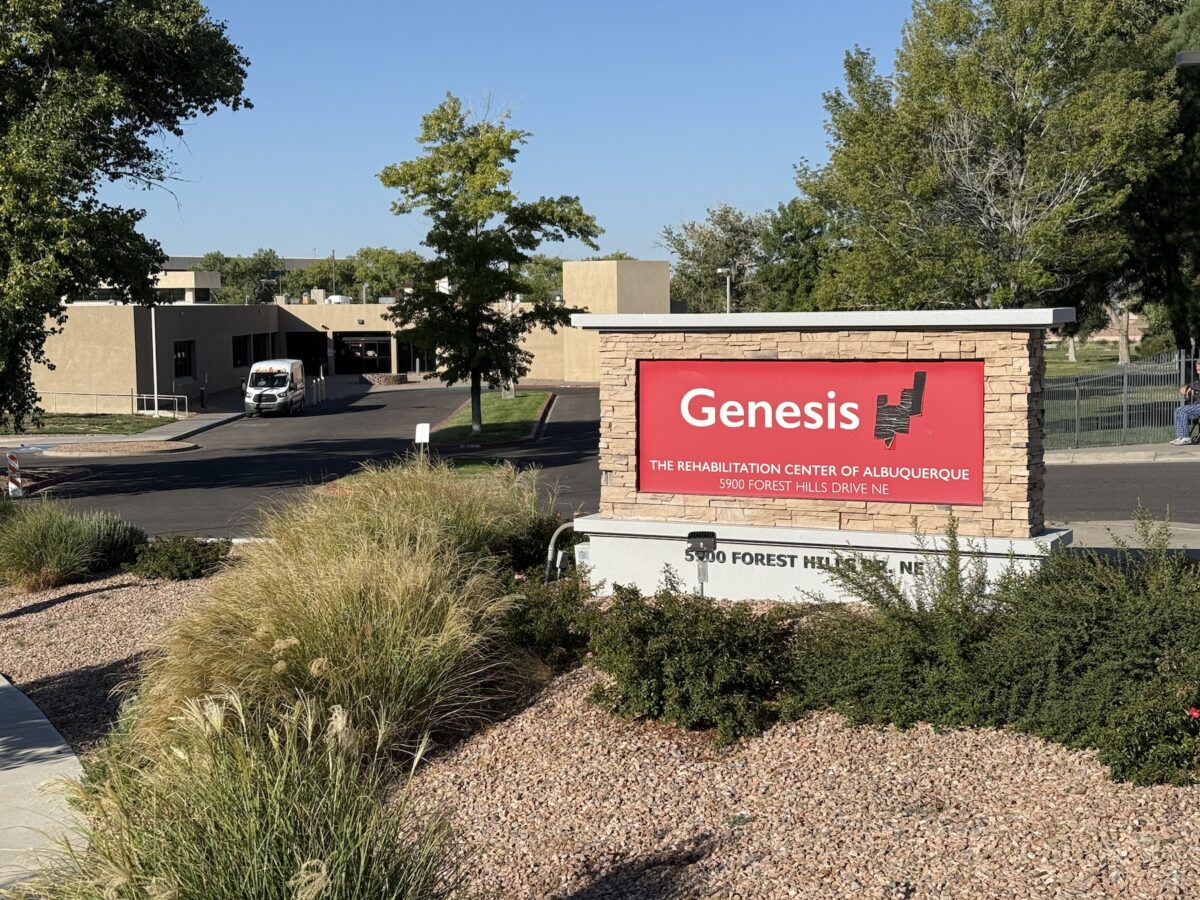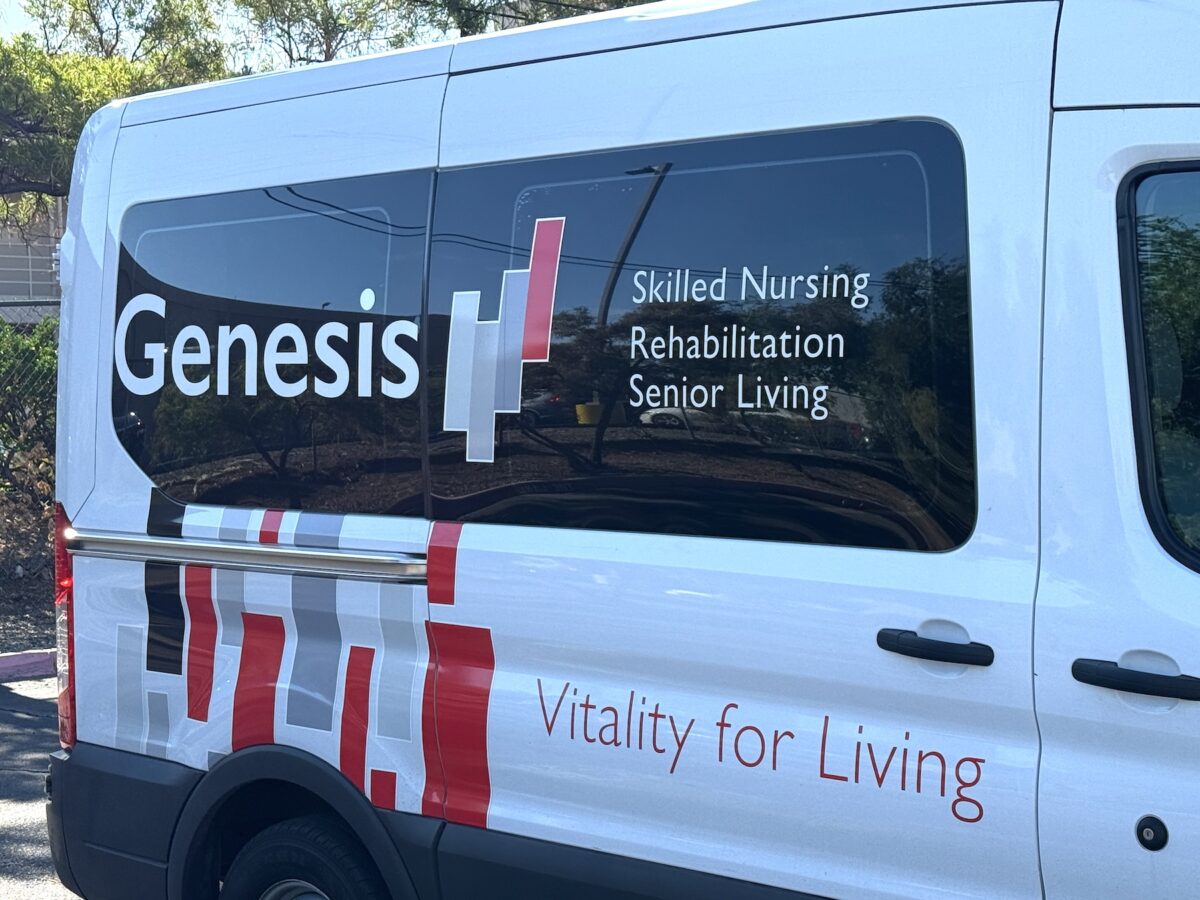
Reporting here is a part of New Mexico Political Report’s ongoing series exploring the quality of care available to New Mexicans through the state’s public and private healthcare system. Follow our series for more on the changing landscape of ownership, profits and health impacts on the system. Read more here.
Reported by: Kevin Hendricks, NM Political Report
This report is original reporting by a New Mexico-based independent journalist with support NMreports.org and its readers and sponsors.
A family has filed a wrongful death lawsuit against multiple healthcare providers after a woman died at a nursing facility in April 2020 following what the complaint alleges was weeks of neglect and inadequate care during the early months of the COVID-19 pandemic.
The complaint, filed in New Mexico’s Second Judicial District Court, names Genesis Health Care LLC, The Rehabilitation Center of Albuquerque LLC, Dr. Ronald Sautter, and several Team Health entities as defendants in the case involving a Sandoval County woman, who died on April 13, 2020, at the age of 67. NM Political Report does not publicly identify persons suffering from healthcare conditions without their consent.
According to court documents, the woman was transferred from Lovelace Westside Hospital to the nursing facility on March 25, 2020, after being hospitalized for diabetic ketoacidosis and acute pancreatitis. The 18-day period between her admission and death forms the basis of the family’s extensive claims against the healthcare providers.
According to bankruptcy filings filed by Genesis in July, the company has set aside $2.9 million for “litigation and settlement” costs, though the litigation remains active with no resolution reached.
The lawsuit paints a detailed picture of what the family alleges was a systematic failure to provide adequate care during a critical period when nursing homes across the country were struggling with COVID-19 protocols and restrictions.
Deteriorating condition goes unnoticed
The complaint alleges that despite the patient’s stable condition upon admission to the nursing facility, defendants failed to properly monitor her health as it steadily deteriorated over nearly three weeks. Court documents claim her weight dropped precipitously from 146.2 pounds at admission to 131 pounds by April 10.
“Although stable upon admission, under defendants’ care, [the patient] suffered cognitive decline, severe weight loss and multiple falls,” the complaint states.
According to the lawsuit, nursing facility staff documented the dramatic weight loss but failed to notify the attending physician or implement interventions to address what the family’s attorneys describe as obvious signs of malnutrition and decline.
The complaint details how Dr. Gregory Gerber, an in-house physiatrist assigned to monitor Serna’s physical rehabilitation, noted concerning changes in her condition as early as April 4, 2020, documenting that she had developed “diffuse weakness, lethargy, was eating poorly and was only alert and oriented to person and place.”
“The nursing facility staff did not notify [the] defendant attending physician of this deterioration, nor did they initiate any increased monitoring of [the patient], or initiate any additional nursing care,” the complaint states.
Critical lab results ignored
The family’s attorneys allege that a pivotal moment came on April 8, 2020, when laboratory results revealed what they describe as “life-threatening abnormalities” requiring immediate medical intervention. The lab work showed critical electrolyte imbalances, including dangerously low sodium and potassium levels, along with elevated blood sugar and kidney dysfunction markers.
According to the lawsuit, these results indicated she was suffering from hyponatremia, hypokalemia and lactic acidosis — conditions the complaint states “needed immediate treatment and increased monitoring by a registered nurse.”
Despite the severity of these findings, the complaint alleges that neither the nursing facility nor Dr. Sautter, who served as the attending physician, provided the necessary immediate care or arranged for transfer to an acute care hospital where such conditions could be properly managed.
“On April 8, 2020, the nursing facility and defendant attending physician needed to transfer [the patient] to an acute care facility where her conditions could be treated appropriately and timely,” the lawsuit states.
Communication breakdown during COVID
The lawsuit details how COVID-19 restrictions severely hampered communication between the facility and the patient’s family, creating what the attorneys describe as a dangerous information vacuum. The complaint alleges that when her partner attempted to contact the facility to check on her condition, he received conflicting and misleading information about her status.
According to court documents, the partner called the facility on April 7, 2020, because the patient’s cell phone wasn’t connecting. During that call, the facility staff told him she “was tired and unable to speak over the phone because she was resting,” but failed to disclose her deteriorating condition.
The lawsuit alleges that the partner became “increasingly concerned how she sounded over the telephone” during subsequent calls, noting that “instead of communicating as she had done earlier about her son and her pets, she now spoke in broken sentences” and “was often unintelligible.”
Even more troubling, according to the complaint, the facility’s phone system was out of service from April 8 through April 11, 2020, preventing any family contact during a critical period when the patient’s condition was rapidly declining.
Final days and death
The complaint provides a detailed timeline of the patient’s final days, alleging continued neglect even as her condition became critical. On April 11, 2020, court documents state that she had an unwitnessed fall in her room while trying to go to the bathroom, had difficulty following directions and had dislodged her IV.
According to the lawsuit, nursing staff noted she had no gripper socks on and documented high blood glucose levels, but “the nursing facility staff did not notify the on-call practitioner of the pain [the patient] was experiencing following the fall.”
By April 12, 2020, the complaint states that her condition had deteriorated to the point where she exhibited “weakness with further clinical decline, serious malnutrition, muscle weakness and was unreliable.”
The lawsuit alleges that only on the evening of April 12 — nearly a week after critical lab results and three days after determining she needed acute care — did facility staff finally contact a nurse practitioner about her condition and receive orders for her immediate transfer to a hospital.
“Instead of sending [the patient] emergently to the acute care facility as ordered, and as was necessary to save her life or give her a chance of survival, the nursing facility staff allowed [the patinet] to linger further in her room without adequate or increased monitoring or care while awaiting transfer,” the complaint states.
She was found unresponsive in her room at approximately 9:20 a.m. on April 13, 2020. Resuscitation efforts were unsuccessful, and she was pronounced dead at approximately 10 a.m.
Consistent flags and low ratings
The Rehabilitation Center of Albuquerque has consistently been rated “below average” for skilled nursing facilities by the federal government’s Center for Medicare and Medicaid Services. A 2021 inspection found more than a dozen deficiencies including several for patient rights, care quality and nutrition services.
A 2019 state Department of Health survey of the facility, finalized just four months before the patient entered The Rehabilitation Center found that “failed to formally investigate injuries of unknown origin” in one patient and “the facility failed to ensure quality care for 1 of 3 residents looked at for abuse and/or neglect” by not reporting changes in conditions of previous patients to a physician. One inspector noted that a medical executive reported that “the facility is using a lot of agency nurses right now and that we just had a job fair and are now even trying other avenues to hire staff. During the conversation he seemed to suggest that the agency nurses were the reason medications were being given late and stated that he felt “They just don’t care.”
Genesis Healthcare’s financial and legal troubles
Genesis Healthcare, one of the nation’s largest nursing home operators, has faced numerous lawsuits and regulatory actions in recent years related to patient care and safety issues across its facilities nationwide.
After accumulating hundreds of millions of dollars in malpractice settlements, payroll obligations and unpaid healthcare debts in New Mexico and elsewhere, the private equity owners responsible for managing the troubled chain of senior and skilled care facilities in July are asking a bankruptcy court to let them avoid paying large chunks of those debts so they can buy more of the company at a discount.
Genesis Healthcare has more than 175 facilities nationwide, including 26 in New Mexico.
In bankruptcy filings filed in late July, Genesis told the court it is incurring $8 million per month in settlements and litigation costs related to inadequate care allegations, in addition to more than $259 million in malpractice claims it is already required to pay nationwide.
New Mexico court dockets include dozens of other allegations of wrongful death, inadequate care and short staffing at Genesis facilities filed since 2021, when the company, claiming near-bankruptcy and cashflow issues, took in over $665 million in COVID grants from federal and state agencies designed to increase staffing, then paid their CEO over $5 million in bonuses.
Representatives for Genesis Healthcare did not respond to requests for comment. The case seeks unspecified monetary damages and is pending in district court along with at least a dozen others against Genesis facilities in New Mexico, but the company’s bankruptcy filing could limit the assets available to compensate victims.
The law firm representing the patient’s family referred our newsroom to the complaint in court.
Share this story and start a conversation
READ MORE
Private equity, public harm: Genesis seeks bankruptcy to avoid accountability for staffing, neglect and deaths in New Mexico nursing homes
After a private equity cash-out and paying millions in CEO bonuses, Genesis Health tells a bankruptcy court it can’t afford to pay $259 million in malpractice costs
800 days without basic nursing care: Nursing home lawsuit alleges neglect in troubled Bloomfield facility
After a private equity cash-out and paying millions in CEO bonuses, Genesis Health tells a bankruptcy court it can’t afford to pay $259 million in malpractice costs





My father was sent to Genesis in Albuquerque, New Mexico after a fall at home and an emergency visit at Presbyterian Emergency for rehab. My dad was a purple heart veteran and, in his 90,’s. When he went into the facility, he was still able to walk with a walker and was in good health. He was not given rehab for weeks and did not have staff to feed him. I had him moved to another facility closer to my house. There is only Genesis in Albuquerque, NM. This facility was worse. No one to feed him again. He lost a lot of weight. My dad did not contract Covid until he went into this facility because his roommate had it when my dad was admitted. I was not allowed to see my dad during the covid. Once they said he was over the covid, I was there that day to visit. My dad was weak and lethargic. I could tell that they still were not feeding him. It was awful. I complained to the management. Dad still was not fed. I finally got the VA to agree to let me take him home. I was doing better care at home. I had caretakers for him. The VA took over a month to agree to let me take dad home. When I brought dad home, he had bruises and sores all over his body including his butt, where he would lay in bed all day. I took pictures. I had the VA home care team come and see him one day after coming home, so they could see what bad shape he was in due to lack of care at Genesis. After a week and half, my dad died at the VA emergency. I believe it was due to the lack of care at the Genesis facility. My dad developed sepsis, that I believe started in the facility when he got covid and was never addressed.